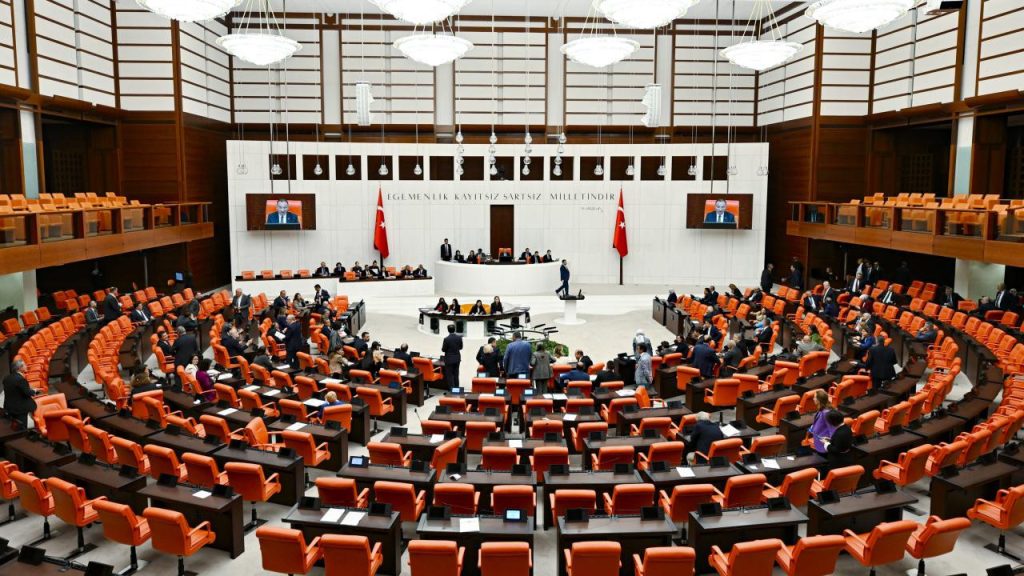In a week marked by significant legislative activity, the Turkish Parliament has passed the Justice Academy Law while gearing up to address the proposed Cybersecurity Law. This piece of legislation, criticized by opposition parties as akin to censorship, aims to empower authorities to act swiftly in the face of cybersecurity threats. Meanwhile, political maneuvering continues as parties prepare for important gatherings and the upcoming congress of the ruling Justice and Development Party (AKP).
| Article Subheadings |
|---|
| 1) Passage of the Justice Academy Law |
| 2) Controversy over Cybersecurity Law |
| 3) Upcoming Political Events |
| 4) CHP Primary Election Timeline |
| 5) İmralı Delegation’s Efforts in Northern Iraq |
Passage of the Justice Academy Law
The Turkish Parliament recently concluded a productive week with the passage of the Justice Academy Law. This law is designed to enhance the training and education of judicial officials in Turkey, aiming to improve the judicial system’s efficacy. It allows for a more structured curriculum and greater investment in the capabilities of legal practitioners, including judges and prosecutors. This legislative advancement reflects the government’s commitment to reforming the judiciary amidst ongoing national and international scrutiny.
Controversy over Cybersecurity Law
The proposed Cybersecurity Law has stirred significant controversy within the political landscape and among civil liberty advocates. Critics, including opposition parties and various press organizations, have labeled the bill as a veiled attempt at censorship. Under its provisions, authorities would have the authority to search premises, make copies of data, and seize materials if deemed necessary to address any threats to national security. Detractors argue that these powers are excessive and could lead to abuse, particularly in the political arena, where they could hinder freedom of expression and press true across cyberspace.
Upcoming Political Events
The political calendar in Turkey is heating up, with several major events anticipated in the coming weeks. Notably, the ruling AKP is actively preparing for a substantial congress scheduled for February 23. This congress is expected to introduce significant changes to the party’s Central Decision and Executive Board, alongside discussions about revamping its leadership structure. Additionally, prominent party leaders are slated to address crucial issues during group meetings, further intensifying the political discourse around domestic priorities like economic stability and governance.
CHP Primary Election Timeline
Within the confines of the main opposition Republican People’s Party (CHP), the timeline for the primary elections to establish its presidential candidate is now officially underway. Candidates are required to submit their applications by February 14, which sets the stage for an intense selection process. The internal dynamics of the CHP are critical, as the outcome of these primaries could significantly influence the party’s strategy and its ability to rally support ahead of the upcoming elections. Technical preparations are ongoing across various levels of the party’s structure, highlighting the importance of this electoral process.
İmralı Delegation’s Efforts in Northern Iraq
A delegation from İmralı is actively engaging with political leaders in Northern Iraq as part of its diplomatic efforts. Recent meetings with figures such as Nechirvan Barzani and Masoud Barzani from the Kurdistan Regional Government reflect ongoing attempts to foster dialogue and collaboration. Following these discussions, the delegation is set to meet Patriotic Union of Kurdistan (PUK) leader Bafel Talabani. Upon their return, an appointment with the Justice Ministry is planned to further negotiate a meeting with the jailed leader of the Kurdistan Workers’ Party (PKK) on İmralı Island. This move is reflective of broader initiatives aimed at addressing longstanding grievances and promoting peace within the region.
| No. | Key Points |
|---|---|
| 1 | The Turkish Parliament passed the Justice Academy Law, aimed at enhancing judicial training. |
| 2 | The proposed Cybersecurity Law has faced criticism for potential censorship and overreach. |
| 3 | Political events, including the AKP congress, are set to reshape the party’s leadership structure. |
| 4 | The CHP is currently preparing for primary elections to select its presidential candidate. |
| 5 | Diplomatic efforts from the İmralı delegation are ongoing in Northern Iraq, focusing on peace talks. |
Summary
The recent legislative developments in Turkey, including the passing of key laws and the upcoming political gatherings, highlight the shifting landscape of the political arena. As the government pursues reform through the Justice Academy Law, the controversial Cybersecurity Law raises pertinent questions around civil liberties and governance. In parallel, the CHP’s presidential candidate selection and the İmralı delegation’s international engagements signify the intricate layers of Turkey’s sociopolitical fabric, which will continue to evolve as the nation approaches crucial electoral milestones.
Frequently Asked Questions
Question: What is the purpose of the Justice Academy Law?
The Justice Academy Law aims to enhance the training and education of judicial officials, thereby improving the effectiveness of the judicial system in Turkey.
Question: Why is the Cybersecurity Law controversial?
The Cybersecurity Law faces criticism for potentially enabling censorship and excessive powers for the authorities, which could infringe upon civil liberties and press freedom.
Question: What is the significance of the CHP primary elections?
The CHP primary elections are crucial in determining the party’s presidential candidate, influencing its strategy and ability to gain support in upcoming elections.


